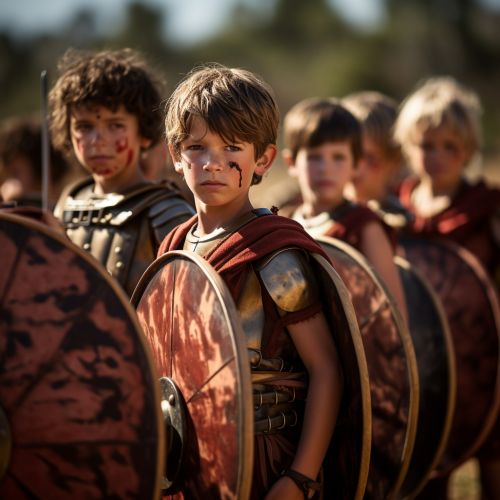Spartan Military Training
Introduction
The Spartan military training, also known as the Agoge, was a rigorous education and training program mandated for all male Spartan citizens, with the exception of the firstborn son in the ruling houses. This system was unique in ancient Greece, where the norm was for a boy to receive his education from his father.


Structure of the Agoge
The Agoge was divided into several stages, each with its own specific focus and training methods. The stages were designed to progressively develop the physical, mental, and moral qualities necessary for a Spartan warrior.
Stage One: Paides (7-12 years)
At the age of seven, Spartan boys were removed from their families and placed in the Agoge system. This stage, known as the Paides, focused on physical training, discipline, and obedience. The boys lived in communal messes and were given a basic education that included reading, writing, and music.
Stage Two: Paidiskoi (12-16 years)
The second stage, known as the Paidiskoi, began when the boys turned twelve. During this stage, the training became more intense. The boys were taught survival skills and were often made to go without food, encouraging them to steal to survive. If caught stealing, they were punished, not for the act of stealing, but for getting caught.
Stage Three: Hebontes (16-20 years)
The third stage, the Hebontes, was the final stage of the Agoge. The boys, now young men, were trained in the arts of war. They were taught to fight in the phalanx, the primary battle formation of the Spartan army.
Role of the Ephors
The Ephors, a group of five elected officials, had the responsibility of overseeing the Agoge. They had the power to inspect the Agoge at any time and could punish any boy or trainer if they found them lacking in their duties.
Role of the Paidonomos
The Paidonomos, a state-appointed official, was responsible for the day-to-day running of the Agoge. He was assisted by the Eirenes, older boys who had already completed their training and were serving their mandatory military service.
Role of the Krypteia
The Krypteia was a secret police force made up of the best graduates of the Agoge. They were used to keep the helot population in check and to eliminate any potential threats to the Spartan state.
Conclusion
The Spartan military training was a unique and effective system that produced some of the best warriors in the ancient world. It was a key factor in Sparta's dominance as a military power in Greece and has been studied and admired by military strategists throughout history.
